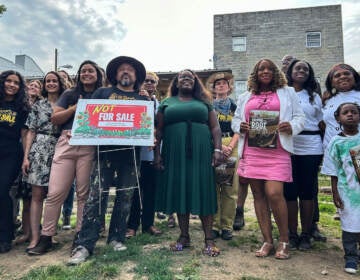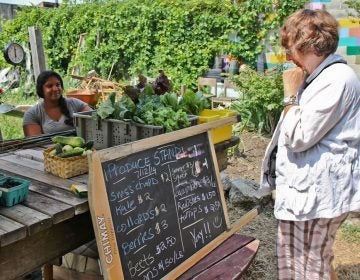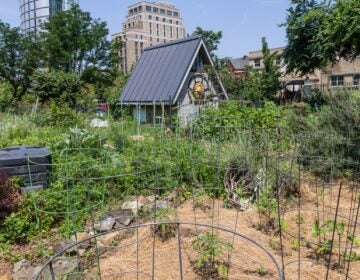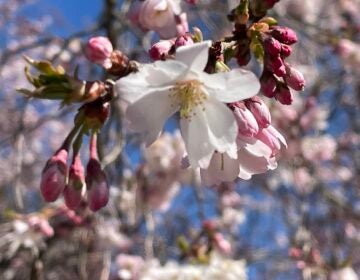3 things to know about the new Pa. law that could help Philly gardeners own the land they steward
The law lowers the bar for “adverse possession.” It’s part of recent moves to improve garden land security.
Listen 1:07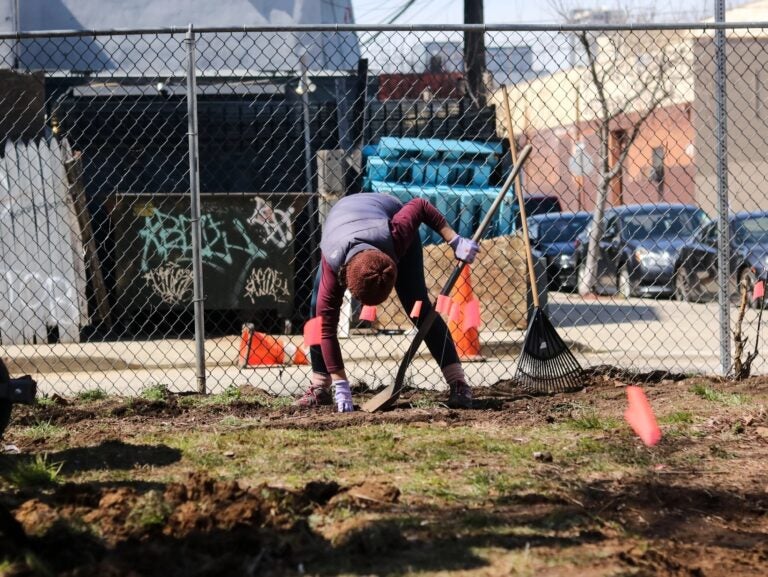
Jessica Noon, a former volunteer for La Finquita, helps prepare a new garden in 2019. (Angela Gervasi for WHYY)
From Philly and the Pa. suburbs to South Jersey and Delaware, what would you like WHYY News to cover? Let us know!
Many of Philadelphia’s community gardens are at risk of being lost to development.
However, a new state law could give gardeners who steward land they don’t own a shorter path to ownership simply by caring for neglected land for more than a decade.
“Many Philadelphia community gardens face the threat of being kicked off vacant land they’ve taken care of for many years — lots that would otherwise sit abandoned in the middle of their neighborhoods,” said Ryan Gittler-Muñiz, environmental justice organizer for the Public Interest Law Center — a nonprofit that pushed for the change — in a written statement. “This is a real step forward that recognizes the profound contributions that people who built these spaces have made for our city.”
Here are three things to know about the new law.
It halves the time required to own land through consistent use
The law, signed by Governor Josh Shapiro earlier this month, makes it easier for Philly gardeners to gain ownership of land using a legal tool called adverse possession.
“Adverse possession is something that’s been around for an incredibly long time,” said Mimi McKenzie, legal director with the Public Interest Law Center, which has represented several gardens seeking land ownership under the old version of the law. “It’s all grounded in the idea that it’s really important for land to be in use.”
To gain ownership through adverse possession, a gardener or organization must care for a parcel of land for a certain period of time, and then file for title to the property.
Pennsylvania currently requires gardeners to hold possession of a property for 21 years before they can seek adverse possession.
The new law, which goes into effect in September, shortens that period for active gardens to 10 years — five of which the land must have been used as a garden. The gardener must then notify the owner of the property, who has one year in which to dispute the gardener’s claim.
“The recognition that 10 years is a significant community investment, deserving of a pathway to ownership, is an incredible step for gardens and green spaces in Philadelphia,” said Teresa Elliott, executive director for Norris Square Neighborhood Project, in a written statement. “We are hopeful that this new law will encourage the continued support for land ownership at the local level and make it easier to protect community gardens in rapidly gentrifying neighborhoods like ours.”
But Migdalia Mendez, who has lived in Norris Square for more than 35 years, worries the shorter statute could benefit people who “just started” taking care of vacant land, rather than long-term stewards like herself. She began cleaning trash and reporting abandoned cars on two vacant lots next to her home in the early 90s. Her husband fenced the lots off, and she used them as a place to park her car, grow ingredients for sofrito and other vegetables and play with her grandchildren.
She successfully filed for title to one of the lots under adverse possession last year, she said, but is now facing a challenge from an heir of the owner. She’s currently seeking title to the other lot under adverse possession. She worries if the lots are sold, developers will build new houses that further damage her home, which she said cracked after a new house was built on the other side.
“We are the ones who are taking care of the empty lots that the owners, they don’t want. … But now, … everybody is selling the lots to build these huge houses,” Mendez said. “I hope that everyone who is fighting for the lots next to their house, I hope they get them. … We have to be first.”
You need to prove ‘notorious’ and ‘hostile’ possession
There are several requirements for the way that gardeners must occupy the land in order to qualify for adverse possession.
Their use of the land must be continuous and exclusive over the course of the 10 years. The possession must also be “hostile,” meaning the rightful owner cannot have granted the gardeners permission to use the land, McKenzie said.
The gardeners’ use of the land must also be “visible, notorious [and] distinct.”
“That can mean all kinds of things,” McKenzie said. “They can show that they put up a fence around the land. They made some improvements on the land, put in raised beds, put a lock on the gate.”
In order to prove all of this in court, a group may need to present old photographs, receipts and witness testimony, McKenzie said.
A gardener or organization will also need to provide a plan for maintaining the garden and removing any trash, as well as paying any taxes on the property. A deed restriction will be placed on the property requiring it to remain a garden for at least seven years, but the restriction can be removed if the new owner proves it imposes a financial hardship.
The law is part of a broader push for land security solutions
Adverse possession is a tool that some gardens — like New Jerusalem garden in North Philly — have used successfully to acquire title to their land.
But the requirements can be hard to meet.
In 2018, a community garden in South Kensington called La Finquita closed after a developer bought the privately owned lot it was located on. The gardeners were unsuccessful in using adverse possession to gain legal ownership after the sale, despite the fact that the property was used as a garden in some form since 1988.
Establishing “exclusive” and “continuous” possession for more than two decades proved challenging, because the involvement of individual people and organizations in the garden had changed over time — and because exclusivity ran counter to the ethos of the garden.
“Everyone knew it had been a garden for well over 21 years,” McKenzie said. “[But] in the life cycle of a community garden, people come, people go. People get old and aren’t able to garden anymore. New people move in … Being able to show in, you know, years six and seven, do we have a witness? Do we have photographs? It became challenging, to say the least.”
The matter ended in a monetary settlement between the developer and the Christian anarchist organization that first started the garden decades earlier.
“If it had been a 10-year statute, that would not have been a challenge,” McKenzie said.
McKenzie said she’s confident that gardens will pursue ownership under the new, shortened version of the adverse possession process. However, the Public Interest Law Center is not yet ready to file any cases.
Meanwhile, gardeners and advocates continue to work on other solutions.
Last summer, organizers pushed the city to buy back the liens on close to 100 parcels used as community gardens, so the city — rather than a private lien holder — can decide whether and when they’re sold at sheriff sale.
Then this spring, City Council passed a bill preserving the city Land Bank’s ability to get priority over other bidders when buying tax-delinquent land through sheriff sale. Organizers consider this an important tool for garden land security, since the Land Bank can transfer land to community gardeners at discounted or nominal prices.
Gardeners and advocates also continue to push the Land Bank to improve its disposition process for community garden land. The agency has only conveyed a dozen properties for use as gardens or open space in the past seven fiscal years, according to city data.
In Fiscal Year 2023, the Land Bank aimed to make 50 dispositions for use as gardens or open space. It did not settle a single one.

Get daily updates from WHYY News!
WHYY is your source for fact-based, in-depth journalism and information. As a nonprofit organization, we rely on financial support from readers like you. Please give today.



